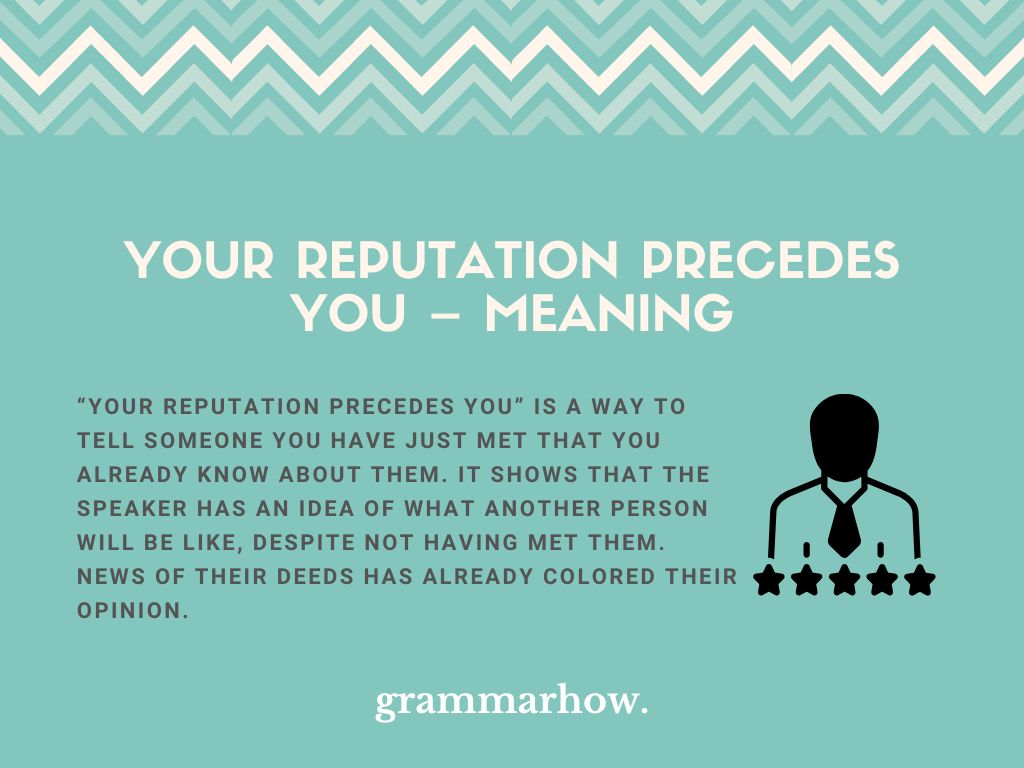Have you ever been told that ‘your reputation precedes you’? Were you left wondering what that means and whether or not you should be offended?
We can tell you what it means, but you’ll have to figure out the last part on your own. This article will definitely help, though.
Your Reputation Precedes You – Meaning
“Your reputation precedes you” is a way to tell someone you have just met that you already know about them. It shows that the speaker has an idea of what another person will be like, despite not having met them. News of their deeds has already colored their opinion.

Context is key to this phrase. It can have either a positive or negative meaning depending on how it is used. Also important is the tone it is delivered with. This is because it is dependent on whether the reputation the person has is negative or positive in the eyes of the speaker.
The Cambridge Dictionary defines “precedes” as “to be or go before something or someone in time or space”. As such, what this phrase is literally saying is that someone’s reputation has arrived before they did.
How to Use “Your Reputation Precedes You” in a Sentence
Here are some examples of how you can use “your reputation precedes you” to mean both positive and negative things:
- “Your reputation precedes you” she said with a satisfied smirk, as he felt the barrel of a gun pressed into the back of his head.
- He replied, “your reputation precedes you”, as the red dot from his colleague’s sniper rifle found its place on her forehead.
- “Your reputation precedes you” she said with a smile, as she handed him the chilled can of his favorite beer.
- He replied, “your reputation precedes you”, as he pulled the bottle of top-shelf vodka out from behind his back.
Your Reputation Precedes You – Origin
We don’t know where exactly this phrase comes from or who said it first, but it seems to have originated in the mid-1900s.
It is a popular phrase, whether used positively or negatively, and has made appearances in recent pieces of famous media.
In the song “Right Hand Man” from the hit musical Hamilton, the phrase is used with regards to the titular character, Alexander Hamilton. Here, it has a positive connotation. George Washington is telling him that he has heard about how good of a fighter he is.
It also makes an appearance in the blockbuster movie Top Gun: Maverick.
Here it is directed towards Tom Cruise’s character, the titular Maverick, and has both positive and negative connotations. His reputation for being a brilliant pilot precedes him but so does his reputation for being, well, a maverick.
Your Reputation Precedes You – Synonyms
There are no phrases that are exact synonyms for “your reputation precedes you”. However, there are some phrases that speak to the similar concept of rumors:
- Heard it through the grapevine
This phrase indicates that you have heard a piece of information about someone or something that didn’t come directly from that person, or anyone involved with the thing. It is similar in the concept of news traveling faster than people.
The words below could all be use to describe the type of person whose reputation tends to precede them:
- Notorious
- Infamous
- Famous
- Renowned
Phrases That Mean the Opposite of “Your Reputation Precedes You”
We can think of one phrase that means the opposite of “your reputation precedes you”:
- Unheard-of
This phrase literally refers to something or someone that you haven’t heard of. If you call someone “unheard-of” it means their reputation definitely hasn’t preceded them.
Correct Ways to Say “Your Reputation Precedes You”
There are a few variations on this phrase that are correct and convey the same message:
- Their reputation precedes them
- His reputation precedes him
- Her reputation precedes her
- Your reputation preceded you
Incorrect Ways to Use “Your Reputation Precedes You”
You can’t use this phrase if the speaker is talking to somebody that they have already met and know. It also can’t be used if the speaker doesn’t know anything about the person they are addressing.
In What Situations Can You Use “Your Reputation Precedes You”?
Use this phrase to indicate that the speaker knows a lot about a person and has already formed an opinion of them, despite not having interacted with them before. It can have negative or positive connotations depending on the context that you use it in.
